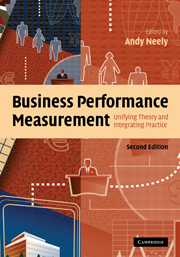Book contents
- Frontmatter
- Contents
- List of figures
- List of tables
- List of boxes
- List of contributors
- Introduction
- Part I Performance measurement – functional analyses and theoretical foundations
- Part II Performance measurement – frameworks and methodologies
- Part III Performance measurement – practicalities and challenges
- Part IV Performance measurement in public services
- Part V Performance measurement – emerging issues and enduring questions
- Index
Part I - Performance measurement – functional analyses and theoretical foundations
Published online by Cambridge University Press: 22 September 2009
- Frontmatter
- Contents
- List of figures
- List of tables
- List of boxes
- List of contributors
- Introduction
- Part I Performance measurement – functional analyses and theoretical foundations
- Part II Performance measurement – frameworks and methodologies
- Part III Performance measurement – practicalities and challenges
- Part IV Performance measurement in public services
- Part V Performance measurement – emerging issues and enduring questions
- Index
Summary
By its nature performance measurement is a diverse subject. Researchers with functional backgrounds as varied as accounting, operations management, marketing, finance, economics, psychology and sociology are all actively working in the field. As discussed in the introduction, this incredible diversity brings with it both challenges and opportunities. It results in a fascinating richness, but also makes it extremely difficult for each generations of researchers to build upon one another's work. A significant barrier stems from the fact that, traditionally, the way academic careers develop is through functional specialization. Accountants talk to accountants. Operations managers meet with operations managers. Marketing specializts network with other marketing specialists. The result is deep and rich streams of functionally specialized research, often with limited cross-fertilization. The aim of this first section is to begin the process of redressing this shortcoming by drawing together several functionally based reviews of performance measurement.
The section contains six chapters. The first, by David Otley, reviews measurement from an accounting and finance perspective and explores the different roles of measurement. Otley argues that the accounting community implicitly recognizes that measurement systems have three fundamentally different roles in organizations. First, they provide a tool for financial management. Second, they provide an objective for overall business performance. Third, they provide a means of motivation and control. A key theme in Otley's contribution is that far too often academics and practitioners do not recognize these three different roles, and the result can be significant confusion, especially when a measurement system designed to fulfil one role is used for another.
Information
- Type
- Chapter
- Information
- Business Performance MeasurementUnifying Theory and Integrating Practice, pp. 7 - 10Publisher: Cambridge University PressPrint publication year: 2007
